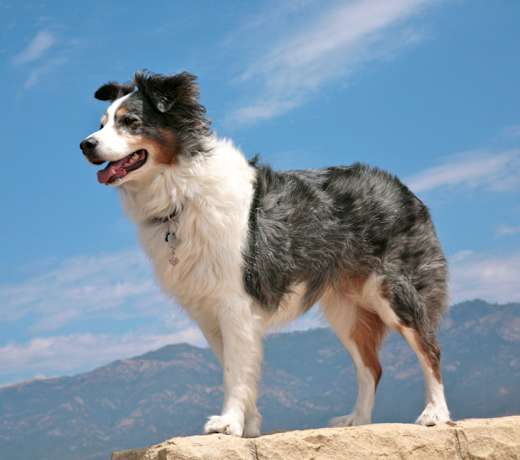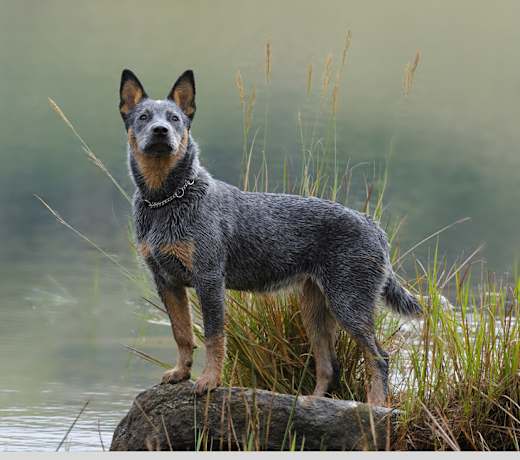Australian Kelpies are medium-sized dogs, most weighing 25 to 45 pounds and standing between 17 to 20 inches tall.
Australian Kelpie
Breed Type: Herding
Common nicknames: Kelpie
Coat: Smooth, double
Hypoallergenic: No, they will likely trigger allergies.
Temperament: Gentle, loving, energetic, intelligent
Life expectancy: 10-13 years
Color & patterns:
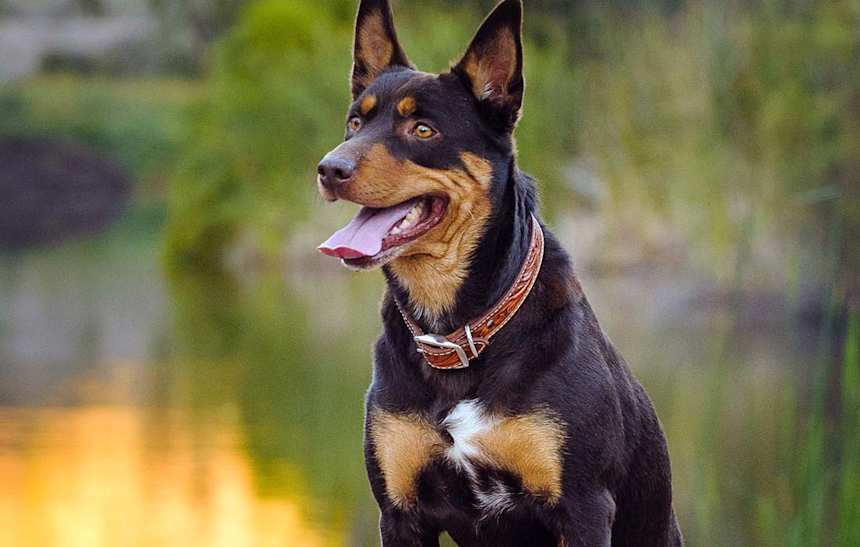
Meet the energetic and intelligent Australian Kelpie, a versatile and hardworking canine companion who will keep you on your toes. These remarkable pups are agile athletes, with their keen intelligence and boundless energy. They have weather-resistant coats that require minimal grooming, and athletic builds. What makes Australian Kelpies truly remarkable is their intelligence and versatility. With their quick learning abilities and unwavering focus, they excel in various tasks, from herding livestock to participating in dog sports like agility and obedience. With their sharp wit and spirited personality, these pups are sure to bring excitement and joy to your life.
Australian Kelpie characteristics
Learn about about Australian Kelpie basics like their fur colors, shedding levels, how much grooming they need, and other Australian Kelpie facts.
Average height
17-20 inches (43.2-50.8cm)
Average weight
25-45 pounds (11.3-20.4 kg)
Average lifespan
10-13 years
Exercise needs
Grooming needs
Full-grown size
Good with cats
Good with kids
Training aptitude
What colors do Australian Kelpies come in?
Australian Kelpies come in colors including black, brown, blue, red, white, and fawn. The most common color for Australian Kelpies is black and tan. Their coats may also have markings such as white patches or spots.
Do Australian Kelpies shed?
Yes, Australian Kelpies shed a moderate amount, which can be minimized by regular brushing. Their short double coat sheds throughout the year, with heavier shedding during seasonal changes. Grooming an Australian Kelpie is pretty simple: regular brushing will minimize their shedding and keep their coats healthy.
How long do Australian Kelpies live?
Australian Kelpies typically live 10 to 13 years. With proper care, regular exercise, a balanced diet, and routine veterinary check-ups, Australian Kelpies can live long and healthy lives. This breed requires mental stimulation, socialization, and plenty of exercise to help maintain their overall well-being and longevity.
What is an Australian Kelpie?
An Australian Kelpie is a medium-sized breed of working dog often used for herding livestock, such as cattle and sheep. The word “Kelpie” is a Gaelic word meaning “water sprite.” Australian Kelpies are loyal and hardworking companions, making them popular among farmers and active families.
How many types of Australian Kelpies are there?
Australian Kelpies are divided into two types: working Kelpies and show Kelpies. Working Kelpies are generally shorter and more muscular than show Kelpies.
When do Australian Kelpies stop growing?
Australian Kelpies stop growing and reach their full adult size between 12 to 18 months of age. Individual dogs will vary, of course, and some Australian Kelpies can continue to fill out and develop muscle mass up to around two years of age. Proper nutrition, exercise, and veterinary care during their early growth period will ensure the health and well-being of your Australian Kelpie as they reach their full size.
What breeds make up the Australian Kelpie?
The Australian Kelpie is primarily a mix of Collie and Dingo breeds. The Collie breed contributes to the Kelpie’s herding instincts and intelligence, while the Dingo breed adds to their agility and endurance. These two breeds combined create the unique and versatile Australian Kelpie known for their exceptional herding abilities and loyal nature.
Are Australian Kelpies rare?
Australian Kelpies are not considered rare, as they are a popular and well-known breed, especially in Australia, where they originated. They are highly valued for their intelligence, physical dexterity, and facility with livestock, making them a common choice for farmers.
Australian Kelpie history
Learn about where the Australian Kelpie came from.
Where are Australian Kelpies from?
Australian Kelpies are from Australia. In the 19th century, Scottish Collies were brought to Australia and crossed with Dingoes (wild dogs native to Australia) to produce a breed that could cover enormous distances in rough terrain and intense heat. The resulting mix, the Australian Kelpie, is an ideal working dog for Australian farms and ranches. The word “Kelpie” is actually a Gaelic word meaning “water sprite.”
Australian Kelpie temperament
Learn about about the Australian Kelpie temperament and how well they fit into your lifestyle, home environment, and family.
Are Australian Kelpies good guard dogs?
Yes, Australian Kelpies are good guard dogs, thanks to their intelligence, loyalty, and alertness. They are naturally protective of their family and territory, and their indefatigable energy reserves make them vigilant and responsive to potential threats.
However, it’s important to note that Australian Kelpies are primarily bred as herding dogs, so while they can alert you to potential dangers, their guarding instincts may not be as strong as breeds specifically bred for protection work. Ultimately, like any breed, an Australian Kelpie's behavior will depend on their individual temperament, training, and socialization.
Are Australian Kelpies good with kids?
Yes, Australian Kelpies are good with kids due to their gentle and loving nature. As with any breed, always supervise Australian Kelpies and children to facilitate happy and safe interactions. Teaching children how to properly approach and handle dogs is crucial to ensure positive experiences for both the dog and the child, as is teaching dogs how to interact gently with children.
Are Australian Kelpies good family dogs?
Yes, Australian Kelpies are good family dogs for the right family. As working dogs, Australian Kelpies need lots of mental and physical stimulation, so an active family willing to commit to proper training and adventures running, playing, and exploring will be a good fit. A household with children or an energetic person who loves exercising in the outdoors with a devoted companion is the ideal match for this breed.
That said, as with any breed, it is recommended that children are always supervised when interacting with any dog to keep both safe. Teaching children how to properly approach and handle dogs is crucial to ensure positive experiences for both the dog and the child, as is teaching dogs how to interact gently with children.
Are Australian Kelpies easy to train?
Yes, Australian Kelpies are easy to train due to their keen intelligence and desire to please. Couple their unwavering focus with supreme athleticism, and Australian Kelpies can be effectively trained to showcase tricks and compete in dog sports. Just keep in mind that even if a certain dog breed is known to be easy to train, teaching a dog requires a long-term commitment.
Do Australian Kelpies bark a lot?
Yes, Australian Kelpies bark a lot. Like most dogs used as shepherds, the Australian Kelpie’s voice is one of their main tools when working with livestock. Their tendency to bark is high, especially when nervous. As with any dog, they can be discouraged from barking with proper training and exercise.
Are Australian Kelpies good with cats?
Yes, Australian Kelpies can be good with cats if properly socialized to your cat or introduced at a young age, but since they were bred to herd, Australian Kelpies often chase cats or try to herd them. Australian Kelpies likely won’t try to hurt cats as they’re non-aggressive by nature.
Are Australian Kelpies good with other dogs?
Yes, Australian Kelpies are good with other dogs if properly socialized from a young age. Positive interactions with other dogs will help Australian Kelpies develop good relationships with them, although individual dogs have their own unique temperaments and experiences. Remember to supervise interactions and train your Australian Kelpie to foster pleasant interactions with other dogs.
Are Australian Kelpies smart?
Yes, Australian Kelpies are very smart. They are highly trainable, quick learners, and excel in activities including herding and obedience. Their intelligence and strong work ethic make them excellent working dogs and ideal companions for active families.
Are Australian Kelpies affectionate?
Yes, Australian Kelpies are affectionate towards their pet parents and families. While they are known for their high energy and drive to work, they also form strong bonds with their human companions. They may show their affection through cuddling, following their family members around, and seeking attention and physical contact. Proper socialization and training can help enhance the bond between Australian Kelpies and their families.
Are Australian Kelpies good for first-time pet parents?
Yes, Australian Kelpies can be a good fit for first-time pet parents who are willing to put in the time and effort to properly train and socialize them. Because these dogs are super-smart and highly athletic, they require consistent training, mental stimulation, and physical exercise. With the right guidance and commitment, Australian Kelpies make loyal and loving companions for first-time parents. It's important to research the breed thoroughly and be prepared for the responsibilities that come with owning a high-energy working dog like the Australian Kelpie.
Are Australian Kelpies good for apartments?
No, Australian Kelpies aren’t good for apartments. With their high energy levels and need for regular exercise and mental stimulation, Australian Kelpies don’t thrive in tight living quarters. Australian Kelpies may become bored and exhibit destructive behaviors without sufficient exercise and mental stimulation. If you live in an apartment and are considering an Australian Kelpie, it’s important to ensure you can provide them with enough exercise and mental enrichment to keep them happy and healthy (and your home intact).
Do Australian Kelpies like water?
Some Australian Kelpies like swimming and playing in the water. Others aren’t as keen to get wet. Ultimately, it depends on the individual dog’s personality and experiences. If you have an Australian Kelpie and are interested in introducing them to water activities, it’s best to start slowly and gauge their comfort level. Always supervise your dog around water to ensure their safety.
Australian Kelpie health
Learn about about the Australian Kelpie health outlook and what diseases they may be prone to at various stages of their life.
Do Australian Kelpies have a lot of health problems?
Australian Kelpies are mostly a very sturdy, healthy breed, but they are prone to certain health issues, including:
Hip and/or elbow dysplasia: Hip and elbow dysplasia are two of the most common skeletal diseases seen in dogs. They are similar diseases in which either the hip or elbow joint has grown abnormally or is misshapen. The abnormal shape prevents the joints and sockets from adequately meeting one another, resulting in rubbing and grinding instead of sliding smoothly. Though the main complication with hip dysplasia is joint instability, the abnormalities present in elbow dysplasia often result in pieces of bone and/or cartilage breaking loose and irritating the joint tissues. Over time, the rubbing from dysplasia can cause a variety of issues such as pain, lameness, and secondary osteoarthritis. Surgery can be done to fix the joint if diagnosed before the onset of arthritis. If you are rescuing an Australian Kelpie, have them checked out by a vet to see if they have or are prone to getting dysplasia, so you know what they will be able to handle regarding activities and exercise.
Cerebellar abiotrophy: Cerebellar abiotrophy is a degenerative disease of the central nervous system that causes the cells in the part of the brain responsible for motor and function to die prematurely. The disease is first noticed as a lack of balance and coordination. There is no cure for cerebellar abiotrophy, but there are medicines to reduce pain and slow the progression of the disease.
Patellar luxation: Also known as slipped kneecaps, patellar luxation is a common problem in many dog breeds. It occurs when slight abnormalities cause the knee joint to slide in and out of place. This can cause pain and occasional lameness. Surgical treatment is available for severe cases although many dogs lead normal lives without treatment.
Are Australian Kelpies hypoallergenic?
No, Australian Kelpies are not hypoallergenic. They have a double coat that sheds moderately throughout the year, which can potentially trigger allergies in some individuals. Regular grooming and brushing can help reduce shedding and minimize the spread of allergens, but it’s always best to spend time around the breed to see how you or your family members react before making a decision.
Popular Australian Kelpie mixes
Breeds that are commonly mixed with Australian Kelpies include Border Collies, Australian Shepherds, and Labrador Retrievers. Characteristics of an Australian Kelpie mix can vary widely depending on the specific breeds involved, the individual dog’s genetics, and its upbringing. A few common Australian Kelpie mixes include:
Border Collie Kelpie (Australian Kelpie + Border Collie)
Australian Kelpie (Australian Kelpie + Australian Shepherd)
Aussiedor (Australian Kelpie + Labrador Retrievers)
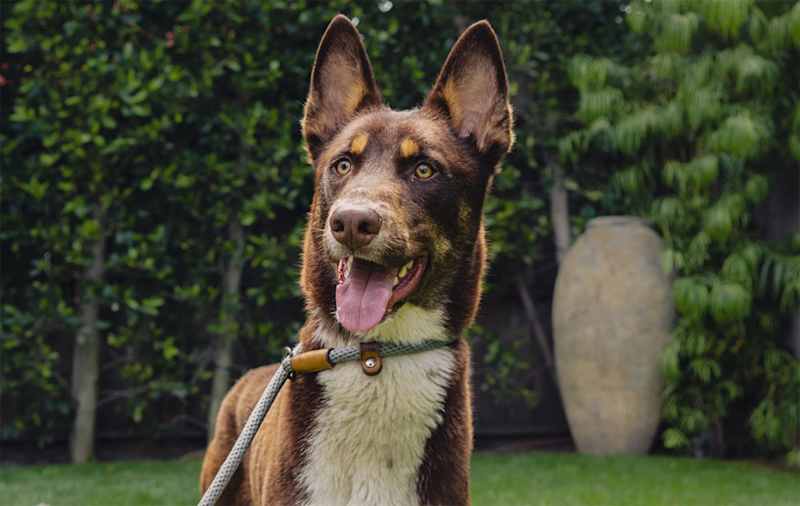
Find Australian Kelpie puppies near you
Adopting an Australian Kelpie
Learn about acquiring an Australian Kelpie - the pros and cons of adopting versus going through a breeder, and associated costs.

SHYA
Australian Kelpie
Female, 2 yrs 5 mos
Los Angeles, CA
House-trained
Spayed or Neutered
Shots are up-to-date
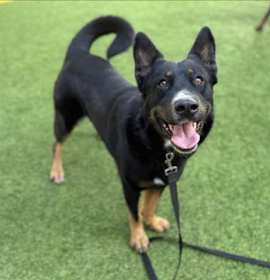
GEMINI
Australian Kelpie
Female, 1 yr 3 mos
Van Nuys, CA

Handsome Buster
Australian Kelpie
Male, young
Los Angeles, CA
House-trained
Spayed or Neutered
Shots are up-to-date

Kiara
Australian Kelpie Pit Bull Terrier
Female, 9 mos
Inglewood, CA
Good with dogs
Spayed or Neutered

Gunner
Australian Kelpie German Shepherd Dog
Male, young
Los Angeles, CA
Shots are up-to-date

Ceasar
Australian Kelpie
Male, adult
Los Angeles, CA
Shots are up-to-date

Faith
Australian Kelpie German Shepherd Dog
Female, puppy
Los Angeles, CA
Good with dogs
Spayed or Neutered
Shots are up-to-date
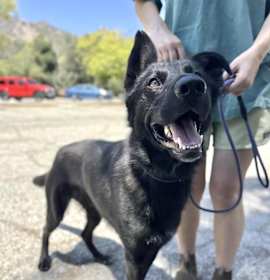
Gabe Jr
Australian Kelpie German Shepherd Dog
Male, 2 yrs 4 mos
Los Angeles, CA
Good with dogs
Not good with cats
House-trained
Spayed or Neutered
Shots are up-to-date

SHYA
Australian Kelpie
Female, 2 yrs 5 mos
Los Angeles, CA
House-trained
Spayed or Neutered
Shots are up-to-date

GEMINI
Australian Kelpie
Female, 1 yr 3 mos
Van Nuys, CA

Handsome Buster
Australian Kelpie
Male, young
Los Angeles, CA
House-trained
Spayed or Neutered
Shots are up-to-date

Kiara
Australian Kelpie Pit Bull Terrier
Female, 9 mos
Inglewood, CA
Good with dogs
Spayed or Neutered

Gunner
Australian Kelpie German Shepherd Dog
Male, young
Los Angeles, CA
Shots are up-to-date

Ceasar
Australian Kelpie
Male, adult
Los Angeles, CA
Shots are up-to-date

